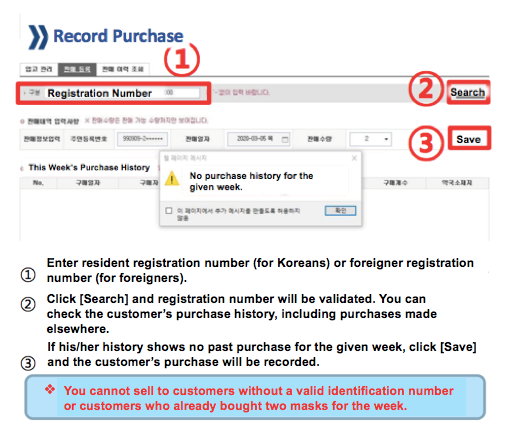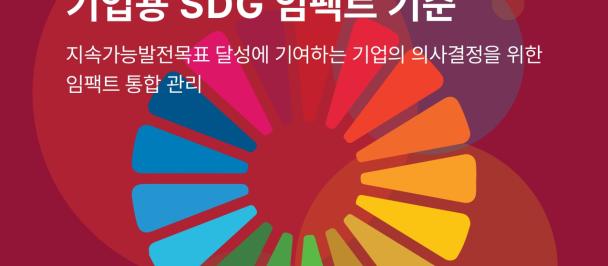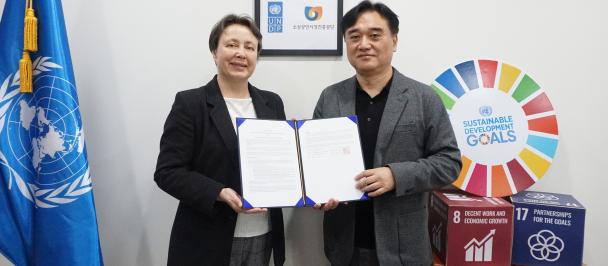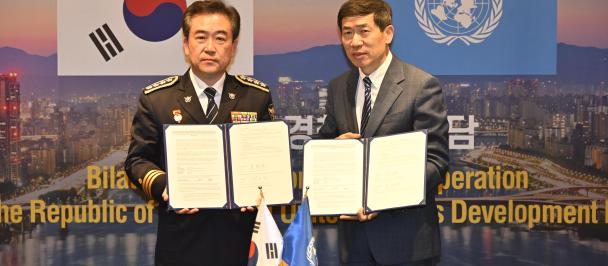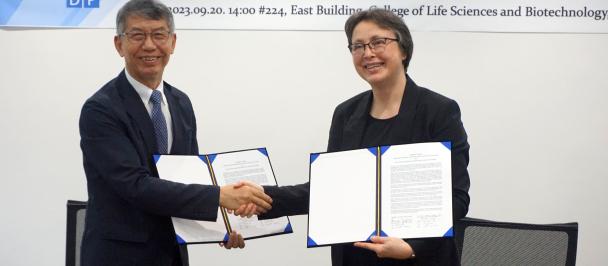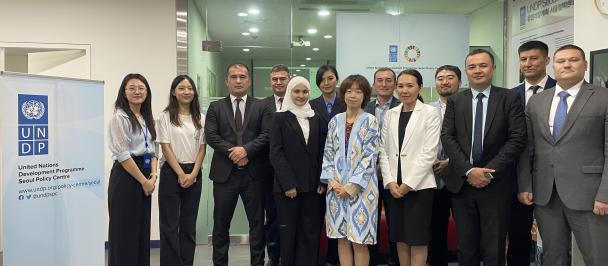User manual posted on HIRA’s website shows screenshot of the server and explains how to record purchases, step by step.
Real-time information on mask stock
(Led by the Health Insurance Review and Assessment Service - HIRA, in collaboration with Ministry of Science and ICT, Ministry of the Interior and Safety, Ministry of Health and Welfare, Ministry of SMEs and Startups, and National Information Society Agency.)
As an emergency measure to stabilize mask supplies, the Republic of Korea’s government implemented a 5-day rotation mask distribution system by which citizens can buy two masks per week on designated days according to their birth year. Purchases can be made at pharmacies, post offices, and Nonghyup grocery stores. Since the initiation of the 5-Day Rotation system on March 9, HIRA has disclosed real-time information on mask stocks and nearby pharmacy locations. This information is provided to the National Information Society Agency, which then outsources API (Application Program Interface) through Naver Cloud. Using this open API database as a software intermediary, portals, start-ups, and other app developers can set up web services and privately develop mobile applications. Owing to HIRA’s information transparency, real-time updates on mask stocks are accessible on Naver, Kakao, and their respective map applications. Moreover, applications such as Mask, Mask Nearby, and Cough Mask have been privately developed by citizens and are free to download. Such services made available by HIRA’s open API approach have made mask purchases for citizens more convenient by reducing wait times and guaranteeing purchases. Since March 19, HIRA has also disclosed information on designated treatment clinics and safety hospitals (patients with respiratory symptoms are separated from all other patients at all times). The data is updated daily at 6:00 AM.
(Since ROK has no shortage of masks anymore, this policy which has been implemented from March 9 to May 31 is not in place at the moment. We decided to leave this information, however, for those who would be tackling the same issue and interested in learning from good practices. While it is an outdated policy in ROK, the principle and lessons learned could be a reference to other countries.)
ID validation and purchase recording server for the 5 Day Rotation System (HIRA)
In order to ensure that the 5 Day Rotation system effectively enforces fair mask distribution for everyone, HIRA provides a sales server through which sellers at both pharmacies and Nonghyup grocery stores are required to record all purchases. The server makes it impossible for an individual to buy more than the two masks allocated to them. Although users initially criticized the server’s slow connection issues, the queues at pharmacies have become noticeably shorter. Pharmacies and Nonghyup grocery stores can access the server through HIRA’s Nursing Facilities Portal.
Emergency supply measures to non-woven fabric for filtration (Ministry of Trade, Industry, and Energy - MOTIE)
To stabilise mask supplies and allow government-level control of mask production, MOTIE implemented ‘Emergency Supply Measures to Non-Woven Fabric for Filtration’ starting from March 6, 2020. These measures required filter producers and sellers to report to the ministry on daily production supplies, sales supplies, per-unit costs, etc. This emergency measure technically bans the export of mask filters, and exceptional cases of exports are to be pre-approved by the ministry. Noncompliance with this requirement can result in up to a two-year sentence or 41,000 USD (50,000,000KRW) penalty fee, and a 8,200 USD (10,000,000KRW) fine for negligence.

 Locations
Locations